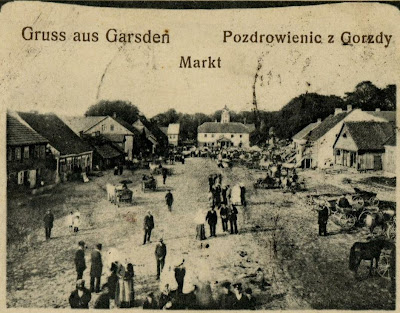 Photo from: Wikipedia
Photo from: Wikipedia Photo from: CCRH.org
Photo from: CCRH.orgI stumbled upon the remains of the site this August.














A Van Dyke beard
I gather by this archaic phrasing that the man speaks to him in Hebrew. David tells him the situation.



Plunge Synagogue
They then journeyed to Plunge [Plungyans], Lithuania, thence to Gorzd, also in Lithuania, where she left the boys in care of trusted smugglers who were to get them across the Russian frontier, an operation run hand in hand with great risk and difficulty.
Market, Gorzd
Running the gauntlet of the Russian frontier was an adventure for the Jews of that period. The Jewish community on the German side of the border operated the underground railroad system so silently that its romantic story is still to be written.
Memel
Leah, with just the girls and baggage, went straight to Memel, Germany (now Klaipeda, Lithuania), where they waited two days before the boys arrived. From there they all went on a tramp schooner to Stettin (Szczecin), Poland, then to Hamburg. Leah bought tickets to New York via Glasgow.
Stettin, 1900

Stettin, 1900
Their first lodging place before they were taken aboard was poor, unsanitary and unsafe. The sleeping quarters were unclean, what with twenty being housed in one room.The Blumenfeld Trail from Europe to the US
Inhumane and uncivilized guards directed the bewildered immigrants to their quarters in the steerage where there was hardly any breathing space. The stench was unbearable. The food was dished out in dinner pails provided by the steamship company. Even drinking water was grudgingly given to the steerage passengers. No precaution was taken against inclement weather. One hundred to two hundred slept in one compartment, in bunks one above the other. There was no light, no privacy or comfort.
Castle Garden
Poor Leah and her children were detained [at Castle Garden, precursor to Ellis Island], for there was no one to meet them. ...She and her children were held as captives of the law until they could hear from Ben-Zion. ...She laid before the commissioner the letters she had from her husband and pleaded for permission to send her eldest son to find him, as the steamer was to remain a week before its return to Europe. ...The immigration officer wired for information to Ludington, Michigan, and reply came that he was not there at that time but was away peddling and they could not reach him. Therefore, they permitted David to go to find his father.
Fifth Avenue and 24th Street circa 1894, by Alessandro Guaccimanni
Leah had the address of a man named Zigler who once worked for her father and was supposed to be living in Madison Square. She told David to find Mr. Zigler first and tell him of their plight and to ask for help. David left after breakfast to look for Madison Square. He had with him $15 in American currency in an inside pocket.